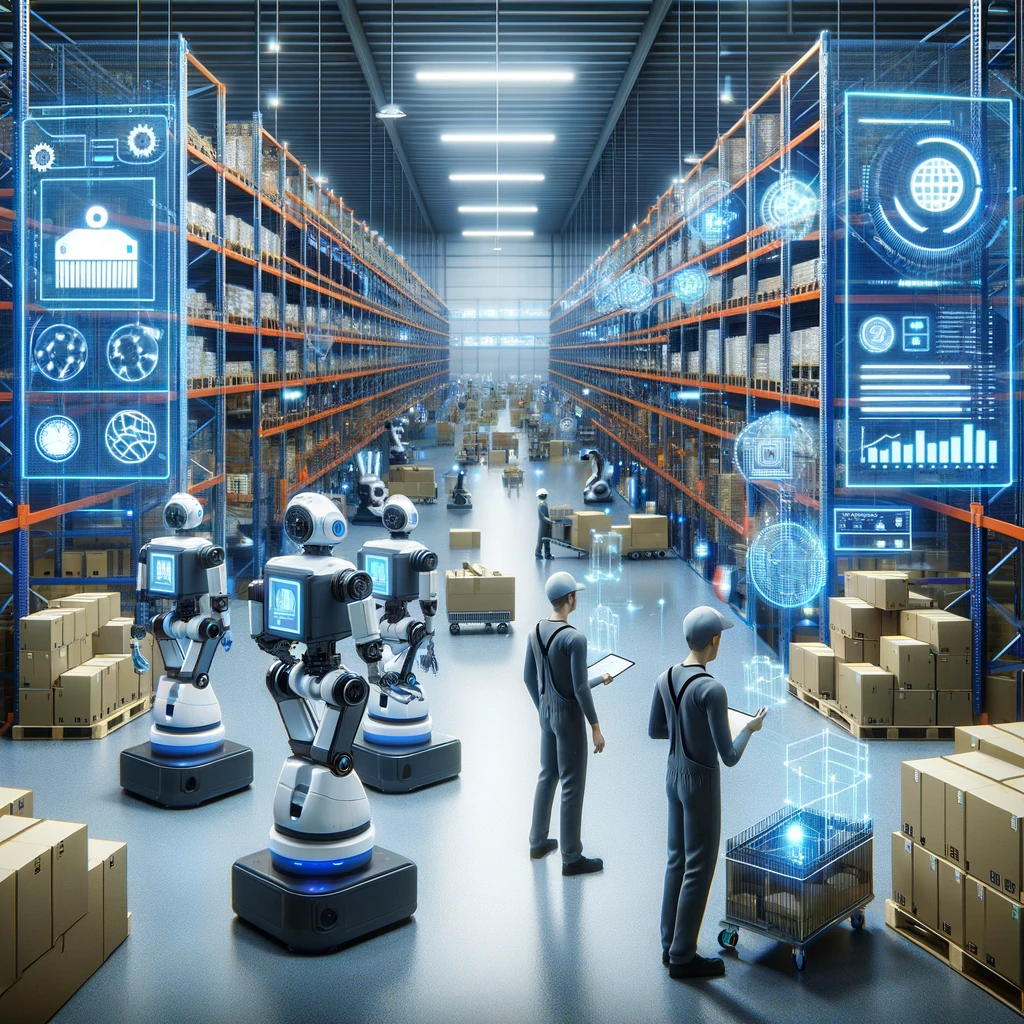In today’s interconnected and fast-paced global economy, supply chains serve as the backbone of commerce, seamlessly transporting goods from manufacturers to consumers across the world. These intricate networks are the lifeblood of businesses, ensuring that products reach their intended destinations efficiently and on time. However, managing the complexities of modern supply chains has become increasingly challenging, with factors like globalization, changing consumer demands, and unforeseen disruptions constantly testing their resilience.
In this dynamic and demanding landscape, the role of Artificial Intelligence (AI) has emerged as a game-changer, offering innovative solutions to enhance the efficiency and effectiveness of supply chain management. AI, a branch of computer science that enables machines to perform tasks that typically require human intelligence, is revolutionizing the way businesses handle their logistics, inventory management, and demand forecasting. This article embarks on a journey to explore the profound impact of AI on global supply chain management, highlighting how predictive logistics, inventory optimization, and demand forecasting are transforming the industry.
As we delve into the depths of supply chain optimization powered by AI, it becomes evident that we are witnessing a paradigm shift in the way businesses approach their logistical challenges. AI is not merely a tool but a strategic asset that empowers organizations to navigate the intricate web of global supply chains with precision and agility. From predicting optimal delivery routes to fine-tuning inventory levels and anticipating shifts in market demand, AI is redefining the rules of the supply chain game.
This exploration into the symbiotic relationship between AI and supply chain management reveals not only the current state of the industry but also the limitless potential for the future. The journey ahead promises not only greater efficiency and cost savings but also increased sustainability and resilience in the face of disruptions. As we journey through the following sections, we will uncover the ways in which AI is not just contributing to but revolutionizing global supply chain management, creating a future where businesses can navigate the complexities of the global marketplace with confidence and precision.
The Crucial Role of Supply Chains
In a globalized world where commerce transcends borders and oceans, supply chains form the lifeline of nearly every industry. A supply chain is a complex network of interconnected entities, including manufacturers, suppliers, distributors, and retailers, working collaboratively to ensure that products reach consumers efficiently. These intricate systems are responsible for the timely delivery of goods, from raw materials to finished products, to their final destinations.
The significance of supply chains in modern commerce cannot be overstated. They not only facilitate the flow of goods but also play a pivotal role in shaping the competitive landscape. Efficient supply chains offer businesses a competitive edge by reducing operational costs, optimizing inventory management, and improving customer satisfaction through timely deliveries. Conversely, inefficient supply chains can result in delays, excess inventory, and higher operational costs, ultimately impacting a company’s bottom line.
The global nature of supply chains means that disruptions in one part of the world can have far-reaching consequences. Events such as natural disasters, political unrest, or global health crises can disrupt supply chains, leading to delays in production and distribution. The COVID-19 pandemic, for example, exposed the vulnerabilities of global supply chains, highlighting the need for greater resilience and adaptability.
As businesses strive to meet the demands of an ever-changing marketplace, supply chain management has become an intricate dance of coordination and optimization. To navigate this complexity effectively, organizations are turning to Artificial Intelligence (AI) for solutions that go beyond human capabilities. AI, with its ability to analyze vast datasets, predict outcomes, and automate decision-making, is reshaping the landscape of global supply chain management.
Understanding Artificial Intelligence (AI)
Before diving deeper into AI’s role in supply chain management, it is essential to grasp the fundamentals of Artificial Intelligence itself. AI refers to the development of computer systems that can perform tasks typically requiring human intelligence. These tasks include problem-solving, pattern recognition, language understanding, and decision-making.
Machine Learning (ML) is a subset of AI that focuses on training algorithms to learn from data. ML algorithms can identify patterns, make predictions, and continuously improve their performance based on feedback. Natural Language Processing (NLP) enables computers to understand, interpret, and generate human language, making it crucial for tasks like sentiment analysis and chatbots. Computer Vision empowers machines to interpret and process visual information from the world, enabling tasks like image recognition.
AI’s potential extends far beyond the realm of supply chains, with applications across various industries, from healthcare to finance. Its ability to analyze large datasets and make data-driven decisions positions AI as a powerful tool for optimization and automation.
Predictive Logistics with AI
Predictive logistics is a critical aspect of supply chain management, as it focuses on forecasting future transportation and distribution needs. AI plays a pivotal role in predictive logistics by leveraging historical data, real-time information, and machine learning algorithms to optimize routing and delivery.
Traditional logistics planning often relies on static schedules and manual decision-making. AI transforms this approach by dynamically adjusting routes based on changing variables, such as traffic conditions, weather, and order volume. Predictive analytics models can even anticipate potential disruptions and recommend alternative routes or delivery times to minimize delays.
AI-driven predictive logistics not only enhance efficiency but also reduce operational costs by optimizing fuel consumption and vehicle utilization. Real-time tracking and monitoring of shipments provide visibility into the supply chain, allowing for better coordination and customer communication.
AI-Enhanced Inventory Management
Inventory management is a critical component of supply chain efficiency. Maintaining an optimal balance between holding excess inventory and facing stockouts is a delicate challenge. AI-driven inventory management solutions use data analytics and machine learning to improve demand forecasting and inventory optimization.
Traditional inventory management relies on historical sales data and manual forecasting. AI takes a more sophisticated approach by considering various factors, including historical sales, seasonality, market trends, and even external events that might impact demand. Machine learning algorithms continuously analyze this data to make accurate predictions, helping organizations stock the right quantity of products at the right time.
Moreover, AI enables dynamic pricing strategies that can automatically adjust prices based on inventory levels and demand fluctuations. This not only optimizes revenue but also prevents overstocking or understocking of products.
Revolutionizing Demand Forecasting with AI
Demand forecasting is a linchpin of supply chain management. Accurate predictions of future demand help organizations plan production, manage inventory, and optimize distribution. AI’s data analysis capabilities make it a formidable tool in the realm of demand forecasting.
Traditional methods of demand forecasting often rely on manual data entry and simple statistical models. AI, on the other hand, can process vast amounts of data, including historical sales, market trends, and external factors, to generate precise forecasts. Machine learning algorithms excel at identifying patterns and anomalies in data, allowing for more accurate predictions.
AI-driven demand forecasting not only improves accuracy but also reduces lead times. Organizations can respond more quickly to changes in demand, optimizing their production and inventory management. This agility is especially crucial in fast-moving industries like fashion and electronics.
AI in Supplier Relationship Management
Supplier relationships are the bedrock of supply chain success. A reliable and transparent network of suppliers ensures a steady flow of materials and goods. AI plays a pivotal role in supplier relationship management by helping organizations identify trustworthy suppliers, assess risks, and optimize procurement strategies.
AI-driven supplier relationship management solutions leverage data analytics and natural language processing to evaluate supplier performance. These solutions can monitor supplier performance in real-time, identifying potential issues or delays before they impact production. Additionally, AI can assess supplier financial health and identify potential risks, such as bankruptcy or supply chain disruptions.
Moreover, AI-enhanced procurement systems can optimize supplier selection based on factors like cost, quality, and delivery times. These systems can recommend the best suppliers for specific products or components, ensuring efficient procurement processes.
Overcoming Supply Chain Disruptions with AI
Supply chains are susceptible to various disruptions, ranging from natural disasters to geopolitical conflicts. AI helps organizations build resilient supply chain strategies by assessing risks, predicting potential disruptions, and enabling swift responses to unforeseen events.
AI algorithms can analyze a multitude of data sources, including weather patterns, political instability, and supplier performance, to identify potential risks to the supply chain. These algorithms can provide early warnings and recommend risk mitigation strategies, such as diversifying suppliers or building strategic stockpiles.
In the face of a disruption, AI can assist in dynamic decision-making. For example, AI-powered systems can reroute shipments, adjust production schedules, and allocate resources based on real-time information. This agility is essential in minimizing the impact of disruptions and ensuring continuity in the supply chain.
Ethical Considerations and Future Directions
As AI continues to revolutionize global supply chain management, it raises important ethical considerations. Ensuring data privacy and security is paramount, as AI systems rely on vast amounts of sensitive information. Organizations must implement robust cybersecurity measures to protect their supply chain data.
Moreover, addressing algorithmic bias is crucial. AI-driven decisions should be fair and free from discrimination. Organizations must continuously audit and fine-tune their AI algorithms to mitigate bias and promote fairness.
Looking to the future, AI’s role in supply chain management is poised to expand further. Autonomous logistics powered by AI-driven vehicles and drones offer the potential for even greater efficiency and cost savings. Additionally, blockchain technology, when integrated with AI, can enhance transparency and traceability throughout the supply chain.
Balancing technological advancement with ethical responsibility will be essential as supply chains continue to evolve. AI, with its transformative potential, holds the key to more efficient, resilient, and sustainable global supply chain management.

Conclusion
In the fast-paced world of global commerce, the efficiency and resilience of supply chains are paramount. As we conclude our exploration into the transformative impact of Artificial Intelligence (AI) on global supply chain management, it becomes evident that we are witnessing a profound shift in the way businesses navigate the complexities of the supply chain landscape.
AI is not merely a tool but a strategic ally, offering innovative solutions that optimize logistics, inventory management, and demand forecasting. The journey through these sections has revealed how AI-driven predictive logistics enhances efficiency, how AI-driven inventory management optimizes resources, and how AI-driven demand forecasting provides accuracy and agility.
Supplier relationship management has been elevated to a new level with AI, enabling organizations to identify trustworthy partners, assess risks, and make informed procurement decisions. Additionally, AI equips supply chains with resilience, enabling dynamic responses to disruptions, and ensuring continuity.
As we look to the future, AI’s role in supply chain management is poised for continued growth. Autonomous logistics, powered by AI-driven vehicles and drones, promise further efficiency gains, while blockchain integration enhances transparency and traceability. However, ethical considerations, including data privacy, algorithmic bias, and cybersecurity, must remain at the forefront of supply chain innovation.
In this ever-evolving landscape, businesses that embrace AI as an integral part of their supply chain strategy are poised to gain a competitive advantage. The efficiencies gained through AI-powered supply chain management not only reduce operational costs but also improve customer satisfaction through timely deliveries and optimized inventory levels.
The transformative potential of AI in global supply chain management holds the key to more efficient, resilient, and sustainable supply chains. In an era where disruptions and uncertainties are the new normal, AI empowers organizations to adapt, thrive, and deliver with confidence. As we move forward, let us continue to harness the power of AI to revolutionize supply chain management, creating a future where businesses can navigate the complexities of the global marketplace with precision, resilience, and sustainability.
